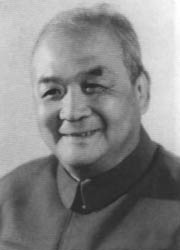Xiao Qian
| Xiao Qian | |
|---|---|
 |
|
| Born |
27 January 1910 Beijing, Qing Empire |
| Died | 11 February 1999 (aged 89) |
| Cause of death | Myocardial infarction |
| Alma mater | Yenching University |
| Xiao Qian | |||||||||
| Chinese | 萧乾 | ||||||||
|---|---|---|---|---|---|---|---|---|---|
| Traditional Chinese | 蕭乾 | ||||||||
|
|||||||||
| Transcriptions | |
|---|---|
| Standard Mandarin | |
| Hanyu Pinyin | Xiāo Qián |
| Wade–Giles | Hsiao Ch'ien |
Xiao Qian (27 January 1910 – 11 February 1999), alias Ruoping (若萍), was a famous essayist, editor, journalist and translator from China. His life spanned the country before and after the establishment of the People's Republic of China.
Xiao was born on 27 January 1910 in Beijing. His name at birth was Xiao Bingqian (蕭秉乾). He was born into a sinicized Mongol family. His father died before his birth, leaving only his mother to raise him. His mother died when he was seven, and he was sent to live with his cousins.
In 1917, at the age of 7, Xiao entered the Chongshi School (崇实小学). It was a church school run by European missionaries. He took up part-time jobs to pay the tuition fees (e.g. weaving Turkish rugs, delivering milk and mimeographing lecture notes in the school administration office). He worked in the morning and studied in the afternoon. In summer 1924, about half a year before completing junior middle school, he worked as a trainee in Beixin Press bookstore. This sparked his interest in literature. In the same year he joined the Communist Youth League.
In 1931 Xiao enrolled at Fu Jen Catholic University. Together with an American youth William Allen he published a magazine in English China in Brief (中國簡報, Zhōngguó Jiǎnbào). It presented works of famous authors such as Lu Xun, Mao Dun, Guo Moruo, Wen Yiduo and Yu Dafu. Due to insufficient funding the magazine ended after eight issues, but it influenced the foreign readers in Beijing. In this period he became a student of Shen Congwen, who greatly influenced Xiao's early writings.
In 1933 Xiao entered the Faculty of English in Yenching University and in autumn of the same year he switched to the Faculty of Journalism. His teacher was an American journalist Edgar Snow. Snow encouraged him to use various literary techniques in journalistic reporting, which became characteristic to Xiao's writing. He graduated in June 1936 and continued the studies as a postgraduate student at Cambridge University. Soon after he became a lecturer at University College London.
...
Wikipedia
